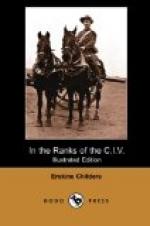“Major McMicking, Officers, non-commissioned officers, and men of the C.I.V. Battery,—
“Lord Roberts has decided to send you home, and I have come to say good-bye and to express my regret at having to part with you. We have been together now for some months, and have had rough times, but in its many engagements the C.I.V. Battery has always done its work well. Before my promotion I commanded a battalion, and I know what a heart-breaking it is to lead gallant fellows up to a strong position unsupported by artillery; and I made up my mind that, if ever I had a separate command, I would never advance infantry without an artillery support. I was fortunate enough to have your Battery with me, and it is very gratifying to know that everything we attempted has been successful. Owing to the excellent practice made by your guns, you have the satisfaction of knowing that you have been the cause of great saving of lives to the Infantry, and at times the Cavalry. I am sorry to lose you, and I shall miss you very much. There is more hard work to be done; and you cannot realize what it is to me to lose a body of men whom I knew I could always rely upon. There are many episodes, some of which will remain a lasting memory to me. One in particular I might refer to, when, two days after leaving Lindley, two companies of Munster Fusiliers came unexpectedly under heavy rifle-fire at short range; your guns coming smartly into action, dispersed the enemy with a few well-directed shrapnel. It was one of the smartest pieces of work I have ever seen. On another occasion, outside Bethlehem (I forget the name of the place),[A] when in a rear-guard action with De Wet, you advanced under a heavy cross-fire of shrapnel, when you rendered splendid service, and saved Roberts’ Horse by silencing two guns and smashing a third. On that day not a single life was lost on our side. On still another occasion, outside Bethlehem, under heavy shell-fire from five guns in a strong position, the steadiness with which your guns were served would have done credit to the finest troops in the Empire. There are other incidents that I might mention, but these three occur to me specially at the moment. You are returning home, to receive a hearty welcome, which you undoubtedly deserve, and I hope you will sometimes think of me, as I certainly shall of you; and now you can tell your friends what I think of you. I wish you a safe and pleasant voyage. Good-bye.”
[Footnote A: Bultfontein.]
We shall also tell them what we thought of him. There was not a man of us but liked, admired, and trusted him—as I know did his whole brigade. And that he trusted us, is an honour we shall not forget.
It was good to be going home again; but I think every one felt half sorry that we were not to share in finishing the work before his brigade. The whole C.I.V. regiment was being sent home together; but the Infantry, of course, had done the bulk of their work when we began ours. It was curious that this was the first occasion on which the three arms of the C.I.V., Infantry, Mounted Infantry, and Artillery, had been united under one command.




